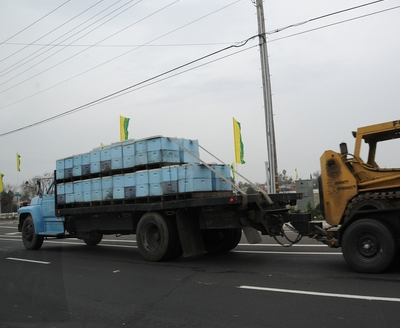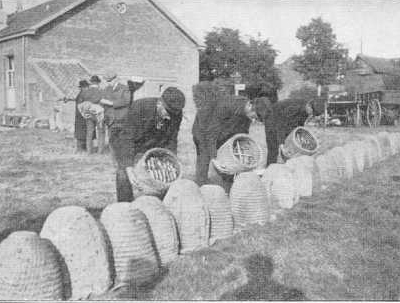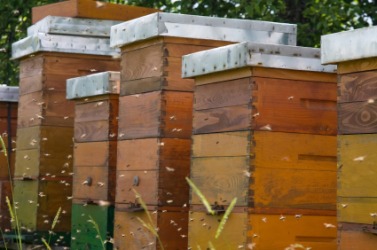
Why modern beekeeping causes declines
 We've all heard that modern
beekeeping is in trouble, but The
Barefoot Beekeeper opened my eyes to problems that I hadn't
considered. Yes, large-scale beekeepers are mean to their bees,
stressing them out by stealing all of their honey and then feeding them
nutrient-free corn
syrup to get them
through the winter. The bees are often given access to only one
type of pollen, which leaves them perpetually malnourished, and they
have to put up with pesticides in their foraging grounds and even in
their hives. We truck bees across the nation, letting pests and
diseases piggy-back with the traveling bees and spread to other
areas. But there's a lot more to the decline of honeybees than
that.
We've all heard that modern
beekeeping is in trouble, but The
Barefoot Beekeeper opened my eyes to problems that I hadn't
considered. Yes, large-scale beekeepers are mean to their bees,
stressing them out by stealing all of their honey and then feeding them
nutrient-free corn
syrup to get them
through the winter. The bees are often given access to only one
type of pollen, which leaves them perpetually malnourished, and they
have to put up with pesticides in their foraging grounds and even in
their hives. We truck bees across the nation, letting pests and
diseases piggy-back with the traveling bees and spread to other
areas. But there's a lot more to the decline of honeybees than
that.
According to PJ
Chandler, the honeybee decline began nearly as soon as the Langstroth
hive was invented. For those of you who don't keep bees,
Langstroth hives are the wooden boxes you're likely to see in modern
apiaries. These hives are built out of wooden boxes with moveable
frames inside, the combination of which allows us to easily look
through a whole hive like paging through a book.
 The Langstroth hive replaced
a much more lethal method, in which bees were kept in skeps that had to
be destroyed to harvest honey, so it was lauded as a great invention at
the time. However, Chandler argues that the Langstroth hive harms
bees in several ways:
The Langstroth hive replaced
a much more lethal method, in which bees were kept in skeps that had to
be destroyed to harvest honey, so it was lauded as a great invention at
the time. However, Chandler argues that the Langstroth hive harms
bees in several ways:
- Drastic temperature changes
--- In a natural hive, bees maintain a temperature of 94 degrees
Fahrenheit year round. When we open a Langstroth hive to page
through those frames, the temperature in the hive drops dramatically
even on a warm summer day. Did you know that varroa mites can
only reproduce at temperatures below 92 degrees? Chandler doesn't
have data to back this up, but his thesis feels sound --- the
temperature spikes in the Langstroth hive make it easier for mites to
gain a toehold, and the loss of heat also stresses out the bees who
have to work hard to bring the hive back up to optimal levels.
- Premade foundation --- As
I've written
previously, the cells in the foundation most beekeepers buy are
larger than the natural cell size. These large cells promote the
spread of varroa mites.
 In addition, we have to
consider other aspects of modern beekeeping, such as the tendency to
concentrate our hives in large apiaries. As I mentioned about my native
bee nests, if you
house a lot of bees together, pests and diseases are much more apt to
spread through the populations. This makes me wonder if we
wouldn't be better off keeping our hives on opposite sides of the
property rather than close together.
In addition, we have to
consider other aspects of modern beekeeping, such as the tendency to
concentrate our hives in large apiaries. As I mentioned about my native
bee nests, if you
house a lot of bees together, pests and diseases are much more apt to
spread through the populations. This makes me wonder if we
wouldn't be better off keeping our hives on opposite sides of the
property rather than close together.
All of that said, most
of us aren't ready to go back to tearing skeps apart and killing
colonies just to get at the honey. Stay tuned for a modern
solution that still keeps the bees healthy.
| This post is part of our The Barefoot Beekeeper lunchtime series.
Read all of the entries: |
Want more in-depth information? Browse through our books.
Or explore more posts by date or by subject.
About us: Anna Hess and Mark Hamilton spent over a decade living self-sufficiently in the mountains of Virginia before moving north to start over from scratch in the foothills of Ohio. They've experimented with permaculture, no-till gardening, trailersteading, home-based microbusinesses and much more, writing about their adventures in both blogs and books.
Want to be notified when new comments are posted on this page? Click on the RSS button after you add a comment to subscribe to the comment feed, or simply check the box beside "email replies to me" while writing your comment.

Usually, we work from 9 to 4, with a one hour lunch break. In the summer, that's inside work in the morning (making chicken waterers, going to town (Mark), or making posts for our chicken blog (me))), then outdoors work in the afternoon. In the winter, we swap the day around so we can be outside when it's warmer.
At 4, we "quit", which means we each retreat to our own computer and write a post about the day. (I save mine to put on the blog the next morning.) Since we've been living the post all day, it usually takes a half hour or less to jot it down on the computer.
Lunchtime series are a bit different. I only make them if I felt like reading non-fiction that week, and often piddle around with them on the weekends. I don't think of them as work --- more of a way to clarify my thinking on a subject. If they feel like work, I just don't make a series that week.
However, with this book project, things are a little different. After I've been writing all day, I don't want to write a post, so I'll sometimes make several in a row during "working" hours and then space them out through the week.
Thanks for saying that about us hitting our stride! I'm glad you're enjoying reading.
Phil --- I know it sounds crazy, but I have to admit that I sometimes wonder if we should go back to a skep type hive. I guess the Warre hive is a modern incarnation of it that's not quite so destructive.
The genetics is tougher to deal with on a small scale. I'm a bit stumped as to how to find hardy bees that aren't going to require chemicals. (This is a bit like finding chicken varieties that haven't had the foraging and brooding abilities bred out of them.) A friend of mine recently found a colony that had been abandoned years ago and been happily going about its business in its Lanstroth hive with no help from anyone --- I wanted those bees!!